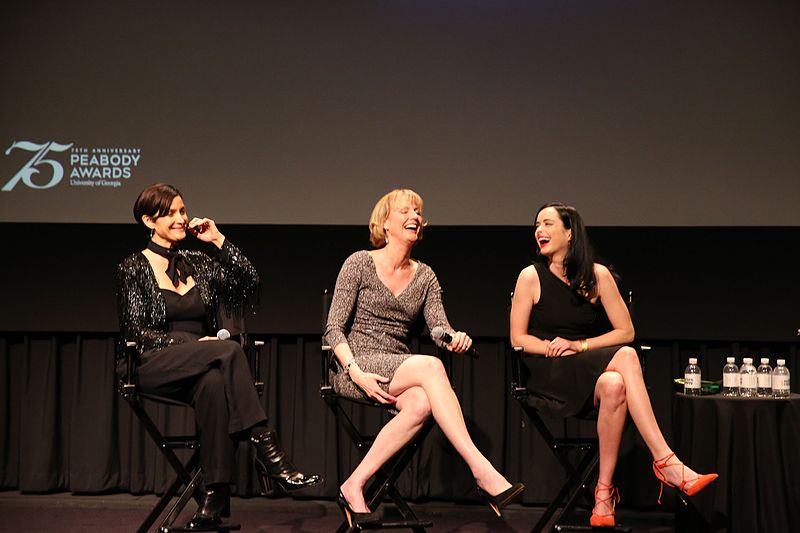Netflix series Marvel’s Jessica Jones is worth the watch
The second season of Marvel’s Jessica Jones continues the plot line on the first season.
Jana Lynn French, WikiMedia, Creative License
Carrie Anne Moss of Marvel’s Jessica Jones appears with her costars at the Peabody Awards. Marvel’s Jessica Jones has two seasons, both available on Netflix.
April 7, 2018
Netflix’s series Marvel’s Jessica Jones starrin has released a second season with a far more complex and morally-grey plotline compared to the first season. Unfortunately, even with the same messages about sexual assault and women’s empowerment, the season reveals its shortcomings as a progressive show when it contains prejudice against powered people yet fails to consider race in the equation.
The second season of the popular Netflix show continues to explore the origin of Jessica Jones’ (Krysten Ritter) powers. Following the revelation in season one that an organization called IGH is connected to the manifestation of her super strength, Trish Walker (Rachael Taylor) hunts for answers, giving the viewer one last look at the detective side of the show.
While season one focused largely on Jessica’s job as a private investigator, season two is far more similar to the typical superhero TV show that’s becoming far more popular. In season one, Jessica was a hard-boiled detective content with drinking away her days and filling her camera roll with proof of any given jealous spouse’s suspicion of infidelity. Circumstance forced her into the action of season one. However, season two is action-packed with less investigation and more punching.
That doesn’t mean season two has no improvements. The audience sees Trish in a far more pivotal role, taking action into her own hands and hopefully on the way to becoming a hero herself, as she did in the Jessica Jones comics.
Season two also introduces a complex storyline involving Jessica’s past and how she will decide her future. Even in season one, Jessica was a classic anti-hero with questionable morals. This season, every action and decision she makes is surrounded by a foggy grey area, adding depth and intrigue to every episode.Season one dealt directly with the aftermath of sexual assault and rape–the biggest villain of the season being Jessica’s abuser. While this season doesn’t center on Jessica’s trauma, the impact of it is clearly shown. Jessica struggles with PTSD and panic attacks. The show realistically handles her trauma and doesn’t let the viewer forget how her past impacts her present.
Seeing a woman with super-strength who can beat nearly anyone in a fight is a gift to young, impressionable girls everywhere. While Jessica isn’t a role model by any means, she is still inspiring. She is also not the only inspiring woman in the season. Each episode is filled with strong female characters standing up for themselves. Some are fighting to make the world a better place and some are fighting for their own selfish desires, but all of them are fully-fleshed out and complex characters, an unfortunate rarity in many television shows.
However, the show isn’t perfect. Several times throughout the season the show reveals oversight when it comes to the issue of race. In a world where people with powers exist, other people will be scared and prejudiced of people with powers. But in a show with main characters who are mostly white, having one of the few people of color in the show be called a bigot was woefully out of place. While superhero stories have historically been used as metaphors for issues like racism, that doesn’t mean this show is allowed to ignore race altogether in favor of making the white protagonist even more of a victim. This article explores more of the intricacies and issues the season runs up against with race.
Season two is most definitely flawed, but it is also worth the time to watch the thirteen 50-minute episodes now streaming on Netflix.





































![Teacher Lore: Mr. Hillman [Podcast]](https://bsmknighterrant.org/wp-content/uploads/2025/03/teacherlorelogo-1200x685.png)












